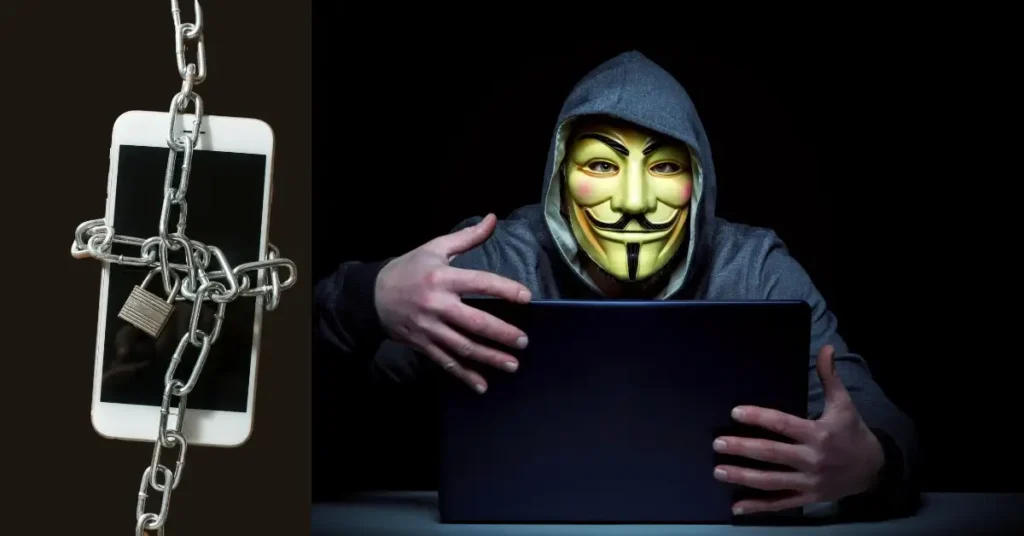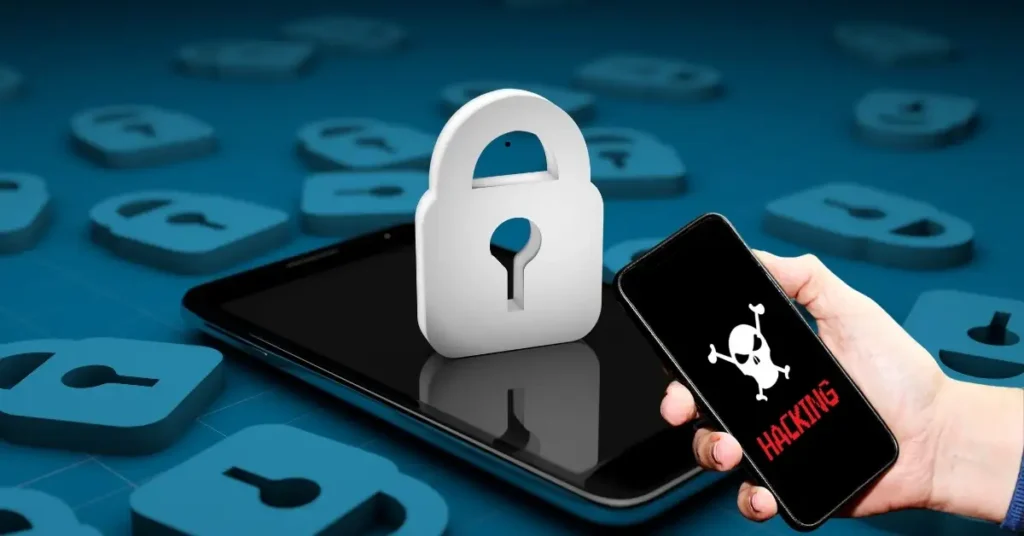Hey there! So you want to know how to protect your phone from hackers? Smart move. Your phone is not just a gadget – this is your digital life. It’s got your photos, messages, banking apps, and maybe many other items that you keep private. The last thing you want is for some hackers to get their hands on them all.
But don’t worry, I’ve covered you. In this article, I will guide you in some straightforward, no-nonsense methods to keep your phone safe from annoying hackers. We’re talking about everything from setting up a solid passcode to using VPNs, backing up your data, and even what to do if your phone gets lost or stolen.
Let’s dive and make sure your phone is as secure as Fort Knox.

Why Phone Security Matters
Before we get into how to protect your phone from hackers, let’s talk about why this is so important. Your phone is a treasure chest of personal information. Hackers can steal your identity, drain your bank account or even use your photos and messages against you. And how much we trust the phone these days is the risk more than ever.
For example, imagine you’re at a coffee shop, using their free Wi-Fi to check your bank account. A hacker can be lurking, intercepting your data, because the network is not secure. Or maybe you download a sketchy app that promises free movies, but ends up logging your keystrokes. These scenarios happen, and they’re why smartphone safety tips are non-negotiable.
But here’s good news: Protecting your phone is not complicated. Most of the time is about simple habits and tools that everyone can use. So let’s get started.
Basic Security Measures
Let’s start with the basics – these are the foundational steps everyone should take to secure their mobile device.
Lock Your Phone
This might seem obvious, but you’d be surprised how many people skip this step. Your phone should always be locked when you are not using it. And I’m not just talking about a simple 4-digit PIN for at least 6-digit passwords. Better yet, if your phone supports it, use biometric locks such as fingerprints or face recognition. These are difficult for hackers to crack, especially if they don’t have physical access to your device.
- Pro Tip: On iPhones, go to Settings > Face ID & Passcode (or Touch ID & Passcode) to set this up. On Android, it’s usually under Settings > Security > Screen Lock.
- Why It Matters: A strong lock is your first line of defence. Without it, anyone who picks up your phone can access everything.
Keep Your Software Updated
Software updates are not just about new features – they are important for security. Hackers are always looking for vulnerabilities in operating systems and apps, and updates often patch these holes. Make sure your phone is set to update automatically, or look for the least regular updates and install them as soon as they are available.
- How to Do It: On iOS, go to Settings > General > Software Update. On Android, check Settings > System > System Update.
- Example: In 2017, the NotPetya malware exploited unpatched systems, causing chaos. Don’t let your phone be the weak link.
App Security: What You Install Matters
Your phone is only as secure as the apps you install on it. Here’s how to keep them in check.
Be Cautious with App Installations
Download the app only from the official store, like Google Play or the Apple App Store. These stores have vetting processes to exclude malicious apps, even though nothing is stupid. Always read reviews and check the permissions an app is asking for. If an app wants to access the camera, microphone or contacts when it doesn’t need to, that’s a red flag.
- Example: A flashlight app doesn’t need access to your contacts or location. If it asks for that, delete it immediately.
- Comparison: Official stores are like supermarkets with quality control, third-party app sources are more like dodgy street markets.
Review Existing Apps
Take a look at the apps you already installed. Go through their permissions and see if they’re asking for more than they need. If you find an app that is suspicious or no longer uses, you need to uninstall it. Disruption to the execution of your phone is not only bad, It can also be a security risk.
- How to Do It: On Android, go to Settings > Apps > See All Apps and review permissions. On iOS, check Settings > Privacy & Security.
Avoid Shady Apps
Some apps may look valid, but they are designed to steal your data. See the apps in large numbers of downloads and apps with good rankings, but still be careful. If an app makes someone promise that looks good, it probably is.
- Free Tool: Use Avast Mobile Security to scan for malicious apps—it’s free and trusted.
Network Security: Stay Safe Online
Your phone connects to the internet, which means it’s vulnerable to network-based attacks. Here’s how to protect your phone from cyberattacks.
Beware of Open Wi-Fi
The public Wi-Fi network is a hacker’s playground. They can set fake hotspots that look legitimate, and when you connect, they can intercept your data. If you are going to use public Wi-Fi, use a VPN (virtual private network). A VPN encrypts your internet traffic, making it very difficult for hackers to spy on your activities.
- Free Tool: Try ProtonVPN—it has a free tier with a no-logs policy and solid encryption.
- Example: I once connected to a “Free Airport Wi-Fi” network, only to realise later it was a fake hotspot. A VPN saved me from potential data theft.
Secure Your Home Wi-Fi
Don’t forget your home network. Change the default password of your router, use a strong, unique password, and enable WPA3 encryption if your router supports it. This will be very difficult for hackers to break down in your home network.
- Quick Tip: Check your router’s settings by typing its IP address (usually 192.168.1.1) into your browser.

Data Protection: Keep Your Info Safe
Protecting your data is crucial, both on and off your phone.
Back Up Your Data Regularly
Regular backups are essential. If your phone gets hacked or stolen, having a backup ensures you don’t lose everything. Use cloud services like Google Drive or iCloud, or connect your phone to your computer for local backups. Just make sure whatever service you use is secure.
- Free Option: Google Drive offers 15GB of free storage for backups.
- Comparison: Cloud backups are convenient but rely on internet access; local backups are more private but require manual effort.
Be Cautious with Sensitive Information
If you can avoid this, do not save sensitive information directly to the phone. For things like bank apps, make sure they have more security measures such as two-factor authentication. In addition, consider encrypting the phone storage to add an extra layer of certainty.
- Example: If you must store sensitive documents, use an app like Folder Lock to encrypt them.
What to Do If Your Phone Is Lost or Stolen
Even with all these precautions, there’s always a chance your phone could be lost or stolen. Here’s what to do to hack-proof your phone in that situation.
Use Find My Device/Phone Features
Both Android and iOS have built-in features to help you find your lost phone. For Android, it’s Find My Device, and for iOS, it’s Find My iPhone. These services can help you locate your phone, play a sound to find it, lock it remotely, or even erase all data if necessary.
- How to Set It Up: On Android, go to google.com/android/find and sign in with your Google account. On iOS, go to icloud.com/find.
Remotely Lock or Erase Your Phone
If you’re sure your phone isn’t coming back, remotely lock it to prevent unauthorized access, or erase all data to protect your information. Remember, once you erase it, you won’t be able to recover anything, so make sure you have backups.
Recognizing Signs of Hacking
Sometimes, you might not even know your phone has been hacked until it’s too late. Here are some signs to watch out for:
| Sign | What It Means |
|---|---|
| Unusual Battery Drain | Malware running in the background could be draining your battery faster than usual. |
| Strange Behavior or Pop-ups | Random pop-ups, apps crashing, or weird phone behaviour could indicate a hack. |
| Unauthorized Account Activity | Strange activity in your email, social media, or bank accounts may signal a breach. |
Advanced Security Tips
For those who want to go the extra mile, here are some advanced mobile security best practices.
Use Anti-Virus Software
Install a reputable anti-virus app on your phone. While mobile malware isn’t as common as on computers, it’s still a threat, especially on Android devices.
- Free Option: Avast Mobile Security offers a free version with decent protection.
Employ a Password Manager
Use a password manager to generate and save complex passwords for all your accounts. This way, even if someone has access to your phone, they will not be able to log in to your accounts without your main password.
- Recommendation: Bitwarden is a free, open-source password manager that works on both Android and iOS.
Adopt an Alter Ego
For security issues, asking for personal information as a mother’s first name or your first pet’s name, consider using fictional answers. This way, although someone knows the real answer, they will not be able to use that information to reset your password.
- Example: Instead of your real mother’s maiden name, use something like “Skywalker” that only you’d know.
FAQs: Common Questions About Phone Security
1. Can my phone be hacked?
Yes, the phone can be hacked, especially if you do not take the right security measures. Hackers can exploit software vulnerabilities, use malicious apps or fool you into accessing them.
2. Is it safe to use public Wi-Fi?
Public Wi-Fi can be risky, as hackers can set up fake hotspots or intercept data on unsecured networks. Always use a VPN when connecting to public Wi-Fi.
3. Do I need antivirus on my phone?
Although it is not so necessary on the computer, having antivirus software on your phone, especially if you use Android, can provide an extra layer of protection against harmful malware.
4. What should I do if I think my phone has been hacked?
First, disconnect the Internet to prevent further damage. If you have one, you can run a scan with your antivirus software. Change the password for any compromised account and consider resetting your phone to factory settings after backing up your data.
5. How often should I back up my phone?
It’s a good idea to back up your phone regularly, at least once a week, or when you add important new data. This way, if something happens, you don’t lose everything.
Conclusion: Stay One Step Ahead
One should not be complicated to protect your phone from hackers. By following these simple steps – to lock your phone, update software, be careful about apps and networks, back up your data and know what to do if something goes wrong, so what to do – you can protect your digital life.
Remember, cybersecurity is an ongoing process. Stay informed, stay vigilant, and don’t let the hackers win. For more tips on how to protect your phone from hackers, check out daytalk.in.

